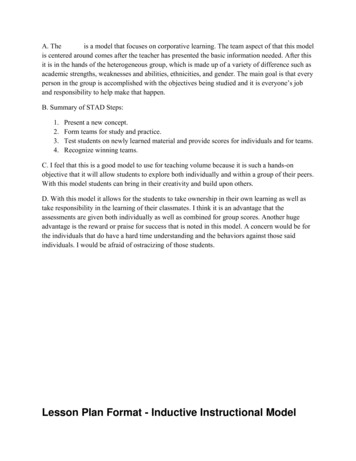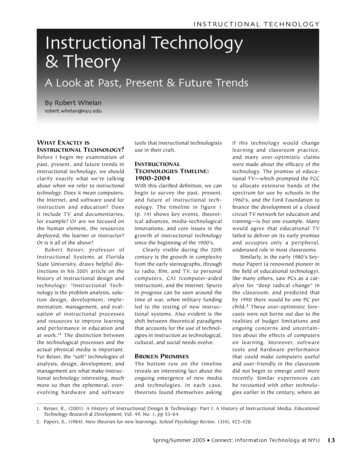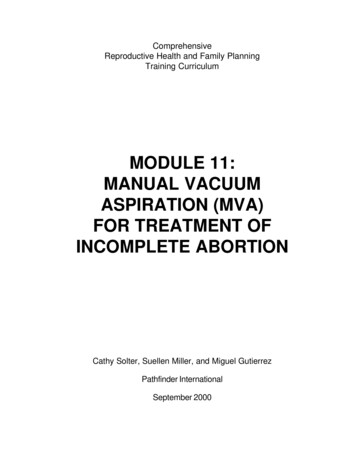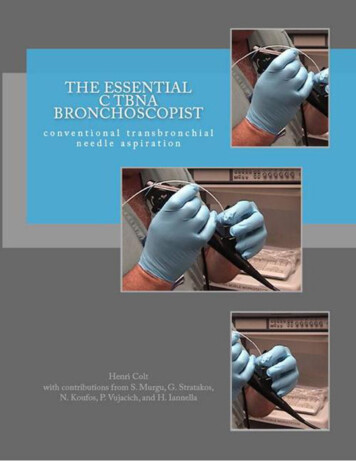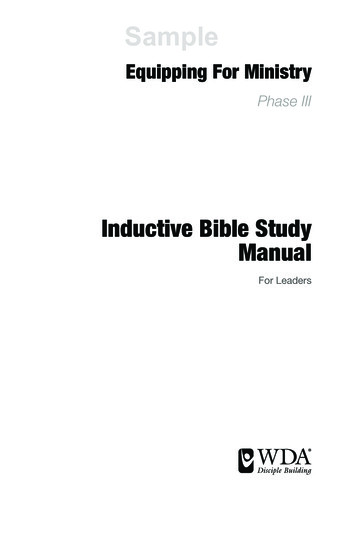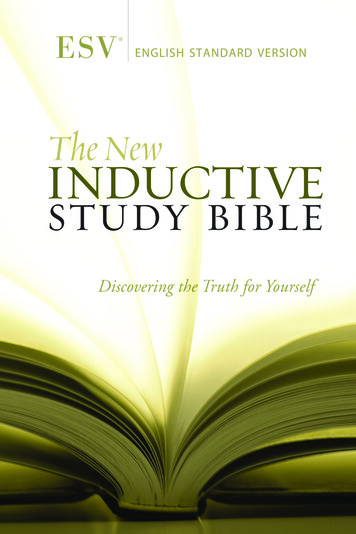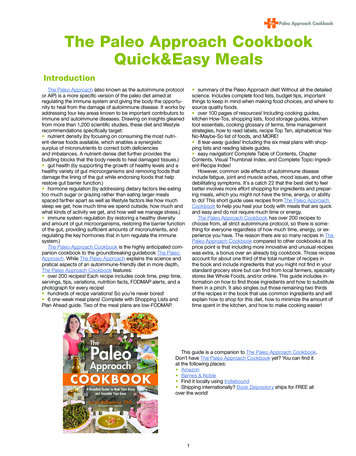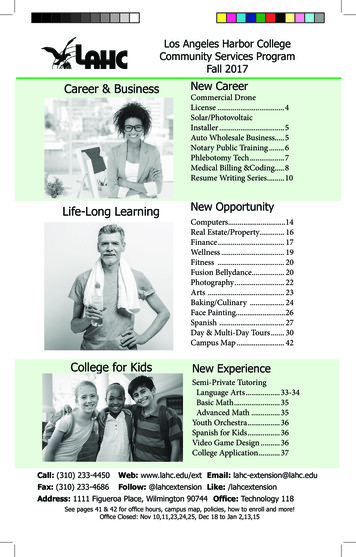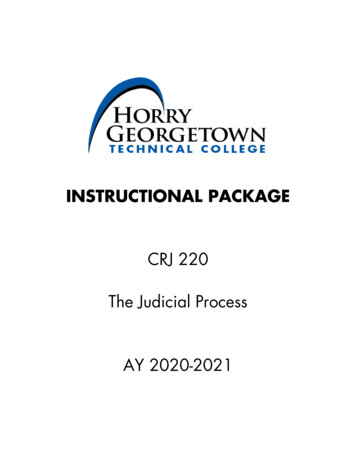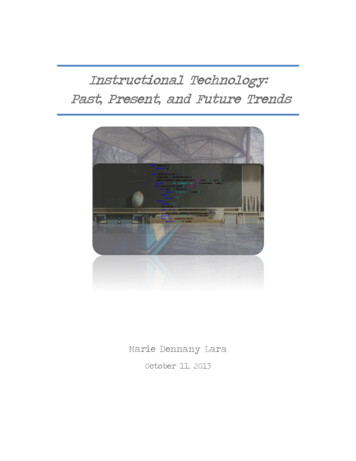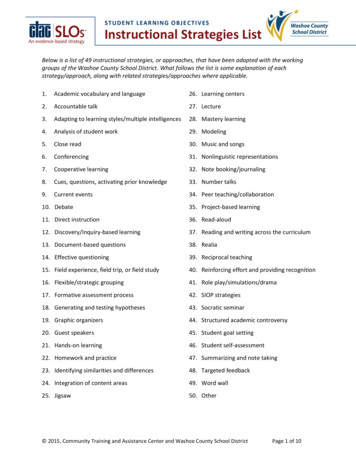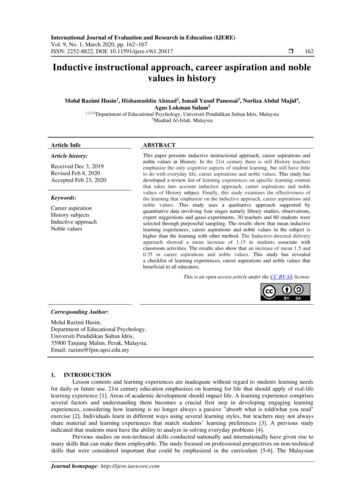
Transcription
International Journal of Evaluation and Research in Education (IJERE)Vol. 9, No. 1, March 2020, pp. 162 167ISSN: 2252-8822, DOI: 10.11591/ijere.v9i1.20417 162Inductive instructional approach, career aspiration and noblevalues in historyMohd Razimi Husin1, Hishamuddin Ahmad2, Ismail Yusuf Panessai3, Norliza Abdul Majid4,Agus Lokman Sulam51,2,3,4Departmentof Educational Psychology, Universiti Pendidikan Sultan Idris, Malaysia5Maahad Al-Islah, MalaysiaArticle InfoABSTRACTArticle history:This paper presents inductive instructional approach, career aspirations andnoble values in History. In the 21st century there is still History teachersemphasize the only cognitive aspects of student learning, but still have littleto do with everyday life, career aspirations and noble values. This study hasdeveloped a review list of learning experiences on specific learning contentthat takes into account inductive approach, career aspirations and noblevalues of History subject. Finally, this study examines the effectiveness ofthe learning that emphasize on the inductive approach, career aspirations andnoble values. This study uses a qualitative approach supported byquantitative data involving four stages namely library studies, observations,expert suggestions and quasi-experiments. 30 teachers and 60 students wereselected through purposeful sampling. The results show that mean inductivelearning experiences, career aspirations and noble values in the subject ishigher than the learning with other method. The Inductive-directed deliveryapproach showed a mean increase of 1.15 in students associate withclassroom activities. The results also show that an increase of mean 1.5 and0.35 in career aspirations and noble values. This study has revealeda checklist of learning experiences, career aspirations and noble values thatbeneficial to all educators.Received Dec 3, 2019Revised Feb 8, 2020Accepted Feb 23, 2020Keywords:Career aspirationHistory subjectsInductive approachNoble valuesThis is an open access article under the CC BY-SA license.Corresponding Author:Mohd Razimi Husin,Department of Educational Psychology,Universiti Pendidikan Sultan Idris,35900 Tanjung Malim, Perak, Malaysia.Email: razimi@fpm.upsi.edu.my1.INTRODUCTIONLesson contents and learning experiences are inadequate without regard to students learning needsfor daily or future use. 21st century education emphasizes on learning for life that should apply of real-lifelearning experience [1]. Areas of academic development should impact life. A learning experience comprisesseveral factors and understanding them becomes a crucial first step in developing engaging learningexperiences, considering how learning is no longer always a passive "absorb what is told/what you read"exercise [2]. Individuals learn in different ways using several learning styles, but teachers may not alwaysshare material and learning experiences that match students’ learning preferences [3]. A previous studyindicated that students must have the ability to analyze in solving everyday problems [4].Previous studies on non-technical skills conducted nationally and internationally have given rise tomany skills that can make them employable. The study focused on professional perspectives on non-technicalskills that were considered important that could be emphasized in the curriculum [5-6]. The MalaysianJournal homepage: http://ijere.iaescore.com
Int J Eval & Res Educ.ISSN: 2252-8822 163Education Development Plan 2013-2025 plans to improve the quality of education delivery. Generally,the policies in the implementation of all types of education, whether domestic or international, emphasizephysical, emotional, spiritual and intellectual development so that students can get to the highest level ofeducation to enable them to find jobs and life does not depend on others [7]. In order to ensure that thisstrategic plan achieves its goals, the focus is on a number of areas including Education and Training.Emphasis is also placed on enhancing the ability and growth of youth in employment and entrepreneurship.One of inductive instructional approach is to implement cooperative learning. It was also foundfrom the teachers that students who work in the cooperative learning groups were more engaged, moreresponsible in completing group assignments and more organized while working in their respectivegroups [8]. In a recent paper [9], the authors point to the four challenges that the 21st century will bring(global interdependence, increasing number of democracies, creative entrepreneurs and the growingimportance of interpersonal relationships) and how cooperation plays a central role and how the tools offeredby the cooperative learning will help meeting these challenges.Students in the upper secondary are required to take core subjects from form one through form five.History is one of the core subjects of all areas of science or humanity. A study found that History teachersemphasize the only cognitive aspects of student learning, but still have little to do with everyday life, careeraspirations and noble values [10-16]. The findings of a study [17], found that the teaching of History subjectswas boring. According to researchers [18-21], have found that aspects of learning approaches need to beapplied with a variety of approaches and techniques involving environment, emotion, sociology, physiologyand psychology [22]. Whereas the learning techniques to be developed should be closely related tothe student's actual situation [17, 23-24]. Teachers' approaches that link with daily life, career aspirations andnoble values are important to make the teaching and learning process more effective, as well the informationand skills provided can be leveraged when students are out of school.This paper present content and learning experiences related to the everyday needs, career aspirationsand strategist values in History subject. This study uses mixed method in developing a review list of learningexperiences, identifying appropriate sub-topics for formulating inductive lesson plans and examiningthe effectiveness of the learning that emphasize on the inductive approach, career aspirations and noblevalues in History. The study showed that mean inductive learning experiences, career aspirations and noblevalues in the subject is higher than the learning with other method. The Inductive-directed delivery approachshowed the mean increase in students associate with classroom activities, career aspirations and noble values.This study has revealed teaching plans that includes of learning experiences, career aspirations and noblevalues that will beneficial to all educators to practice in the classroom.2.RESEARCH METHODThis study used qualitative and quantitative approaches involving library studies, observations,expert suggestions and quasi-experiments analyzed using Nvivo and SPSS software. This study is a designand development study refer to several implementations of the ADDIE (Analysis, Design, Development,Implement, and Evaluate) model and Nominal Group Technique (NGT) approach. NGTs are used forthe process of promoting and generating ideas on issues such as those involving assessment of a curriculum[25]. This technique can be used to measure a product that has been developed. ADDIE involves three mainphases namely the analysis, the design and development, and the testing, whereas NGT involves the expertrecommendation used in Design and Development Research (DDR) module study. But this study did notexactly follow these models and techniques. It just follows a few sections or ideas. The first act of this studyis getting a checklist of learning experiences on learning content that takes into account the requiredactivities, career aspirations and noble values of the subject. Build the checklist involved experts of 30experienced teachers. All points of view are taken as a learning approach called Inductive directed deliveryapproach. Those experts brainstormed on learning experiences, career aspirations and noble values of form 1History subjects [26]. The findings to confirm the study's need of appropriate sub-topics for formulatinginductive lesson plans in History subjects. The inductive lesson plan requires the validity of the 5 experts inthe field. Build the checklist of inductive learning experiences, career aspirations and noble values involvedexperts of 30 experienced teachers. The level of sub-topic’s need was assessed using five scale (5, 7, 18, 23,25) by experts based on the relationship between the learning experience and the daily life of the students asshown in Table 1.Inductive instructional approach, career aspiration and noble values in history (Mohd Razimi Husin)
164 ISSN: 2252-8822Table 1. The checklist of inductive learning experiences, career aspirations, noble values and its levelinvolved experts of 30 experienced teachersTitle le ValuesxyzzyzThen, researchers choose a high-level sub-topic that is four and above based on scale given byexperts. the lesson plan based on three elements, which are inductive learning experiences, career aspirationsand noble values has been developed. The design table of lesson plan as shown in Figure 1.Figure 1. Table of IDDA Lesson planFinally, a quasi-experiment was carried out which involves 30 samples of 15 students in a group thatwill use different teaching methods such as IDDA and regular teaching. The experiment was performed twiceper group, which was cross sectioned into two groups against the two methods [27-28]. Experimental datausing perception surveys were analyzed using Nvivo and SPSS software. The data were pre and post testdata, and perceptual survey data. The method of computing the collected survey data is shown in (1).Σ𝐺1𝑇1 Σ𝐺2𝑇2𝑁 Σ𝐺1𝑇2 Σ𝐺2𝑇1𝑁 𝑓𝑚𝑒𝑎𝑛(1)3.RESULTS AND DISCUSSIONBased on observations made on History subjects to support the literature review, it shows that mostteachers did not plan their learning according to the needs of the students [29-30]. The extent to which thesereal needs are used in everyday life needs to be further discussed. The first finding is presented witha checklist of learning experiences on specific learning content that takes into account inductive approach,career aspirations and noble value of History subject. The finding is then presented with an Identifyappropriate sub-topics for formulating inductive lesson plans in History subjects. Finally, assessingthe effectiveness learning emphasizes on the inductive approach, career aspirations and noble values forthe specific learning content is presented.3.1. Developed a checklist of learning experiences on specific learning content that takes into accountinductive approach, career aspirations and noble values of history subjectThe construction of checklists requires in-depth study of selected subjects that takes into accountthe inductive approach, career aspirations and noble values. The results were obtained through expert opinionusing Nominal Group Techniques (NGTs) in which they have contributed to the issue by building a list ofInt. J. Eval. & Res. Educ. Vol. 9, No. 1, March 2020: 162 - 167
Int J Eval & Res Educ. ISSN: 2252-8822165History learning experiences career aspirations and noble values (Table 2). The contents of the checklist aretitles, sub-titles, learning experiences, level of need, employment and strategic value. The level of need isassessed by experts based on the relationship between the learning experience and the daily life ofthe students.Table 2. The list of experiences of learning history focusing on inductive approach,career aspirations and noble valuesTitle and Sub-titleEarly WorldCivilizationLocationsLearning ExperiencesExplore Development/Agriculture ble ValuesAppreciate and GratefulAppreciate Heritage of EnvironmentAcceptance of Equations and Differences3.2. Appropriate sub-topics for formulating inductive lesson plans in historyThere are a number of sub-topics in form 1 History subject that are appropriate for developingInductive Directed Delivery Approach (IDDA) lesson plans according to the recommendations of experts andcertified by 5 experts in the field. The sub-topics are as Table 3 and Figure 2.Table 3. The sub-topics for formulating inductive lesson plans in HistorySub-topicsArchitecture of RomeCivilizationChapter 6Learning ExperiencesExplore the school'scolosseumPublic Exam of ChineseCivilizationChapter 7Explore the examstatement boardsCareera. ArchitectureNoble Valuesa. Diligenceb. Creativesc. No damage to public propertya. Teachera. Diligenceb. Imitate the success of othersc. Not jealous of others'successFigure 2. Example of IDDA Lesson Plan3.3. Effectiveness learning emphasize on the inductive approach, career aspirations and noble valuesThis study showed that there was a mean increase in perceptual approach perceptions of items 2(Understanding lessons), 4 (Associating classroom activity with lesson content) and 5 (Expanding groupdiscussion) as Table 4, Table 5, Table 6 and Table 7.Inductive instructional approach, career aspiration and noble values in history (Mohd Razimi Husin)
166 ISSN: 2252-8822Table 4. Mean of X approachPerceptionUnderstand the lessonAssociate classroom activities with lesson contentEngage in group discussionsMean3.903.612.90Table 5. Mean of inductive directed delivery approach (IDDA)PerceptionUnderstand the lessonAssociate classroom activities with lesson contentEngage in group discussionsMean4.494.763.44Table 6. Noble values meanPerceptionGroup 1 (x Approach)Group 2 (IDDA Approach)Mean3.864.21Table 7. Career aspiration meanPerceptionGroup 1 (x Approach)Group 2 (IDDA Approach)Mean1.002.504.CONCLUSIONThe construction of checklists have contributed to the issue by building a list of History learningexperiences, career aspirations and noble values. An example of learning experiences is exploringthe locations of development and agriculture, the school's Colosseu
inductive lesson plans in History subjects. The inductive lesson plan requires the validity of the 5 experts in the field. Build the checklist of inductive learning experiences, career aspirations and noble values involved experts of 30 experienced teachers. The level of
